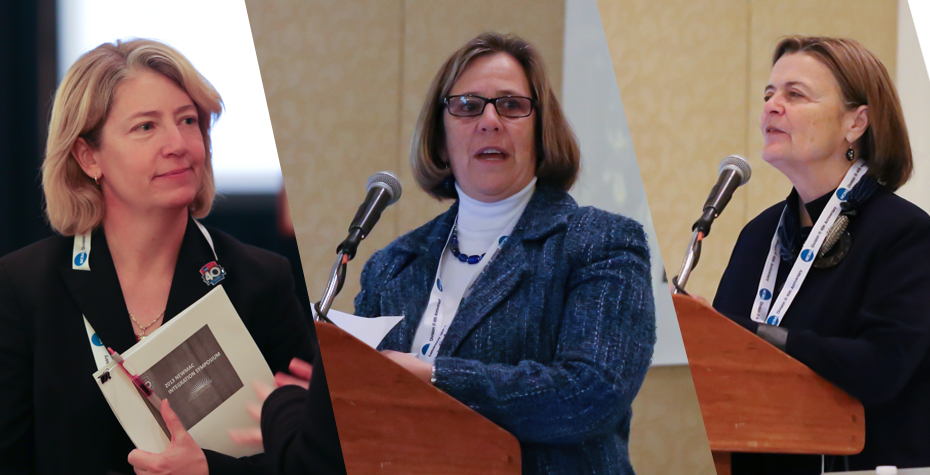Forum on Integration Inspires Integration of Athletes Across Many Divisions

Wellesley had a strong presence at the recent National Collegiate Athletics Association (NCAA)/New England Women’s and Men’s Athletic Conference (NEWMAC) symposium on the theme of integration.
Wellesley College President H. Kim Bottomly, who also serves as chair of the NEWMAC President’s Council, welcomed participants to the event. Wellesley Director of Athletics Bridget Belgiovine, current president of the NEWMAC, helped coordinate the event and introduce speakers and award winners. NCAA Director of Division III Louise McCleary ’87 spoke about the Division III model and answered questions from participants throughout the day. Fifteen other Wellesley faculty and staff from across many divisions joined them in engaging with colleagues from all 11 NEWMAC schools in a day focused on integrating the student-athlete into the full experience of their institutions.
As President Bottomly noted in her opening remarks, integration was the perfect term for the event, for beyond looking at integrating varsity athletes into realms of college life outside the competitive sphere, the conference was “bringing together people who’ve been thinking about athletics for a long time and others who are newcomers to it.” Those folks ranged from athletic directors, coaches, and faculty athletics representatives (including Wellesley’s FAR, Associate Professor of Spanish Joy Renjilian-Burgy) to administrators and vice presidents from admission, alumni, development, and public affairs functions, and residential life leaders and advocates.
Louise McCleary opened the session with a comprehensive overview of what Division III really is. Many people know that its schools do not provide athletic scholarships, but little else. McCleary shared the DIII philosophy, which is to provide for passionate participation in a competitive athletic environment that also allows students a well-rounded collegiate experience involving a balance of rigorous academics and the opportunity to pursue the multitude of other co-curricular and extracurricular offerings on campus. She summed it up in three Ds: Discover, Develop, and Dedicate.
Clearly the philosophy is a good fit with Wellesley’s focus on multidisciplinary learning, broad-based experience, and continual discovery.
By contrast, Division I athletes may be somewhat isolated from the campus experience, training year round and traveling long distances to compete. Team-specific support staff for tutoring, sports medicine, and counseling mean those athletes may never integrate themselves into the general population at their school.
Keynote speaker Donna Lopiano, former CEO of the Women’s Sports Foundation and one of “The 10 Most Powerful Women in Sports” according to Fox Sports, spoke about integrating athletes with disabilities into Division III sports. Given that not all disabilities are visible, she challenged all present to learn how many students with disabilities were already participating. And to think further about outreach and accommodation for those who are not, given the manifold benefits that being a student-athlete brings.
Other speakers talked about collaborations between admission departments and athletics, about extending awareness of a school through its athletics, and about promoting student-athlete retention—both on teams and in school generally. After each talk or panel, participants engaged in small-group conversation on the topic with peers and colleagues from other schools. Wellesley's representatives left the event with much food for thought and were inspired by their own potential for cross-departmental integration.
